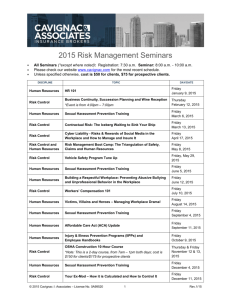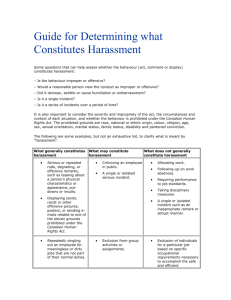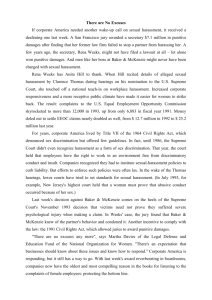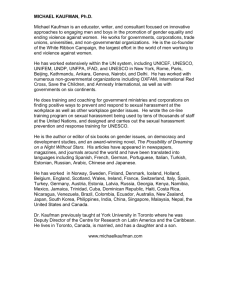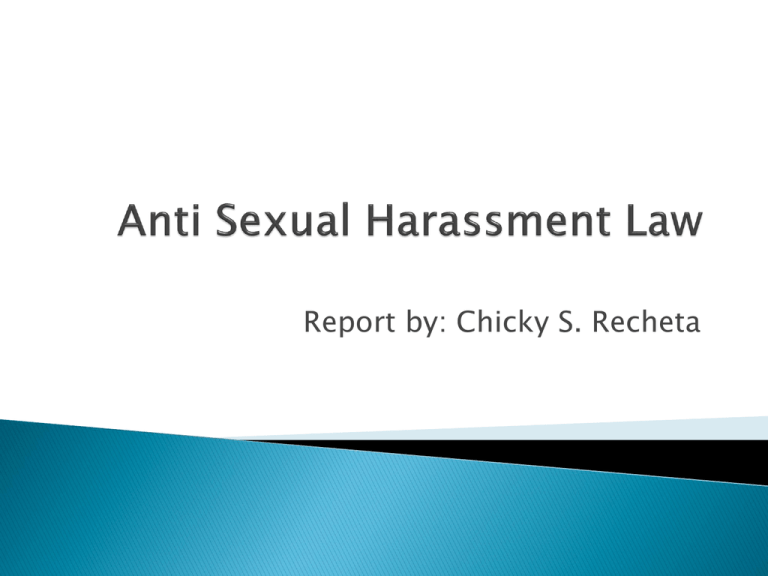
Report by: Chicky S. Recheta
Define the Anti-Sexual Harassment Law
Identify the most common misconceptions
about sexual harassment
Know the proposed amendments to the AntiSexual Harassment Law
Republic Act 7877
Anti-Sexual Harassment Act of 1995
Passed on February 8, 1995
Approved on February 14, 1995
Value the dignity of every individual;
Enhance the development of its human
resources;
Guarantee full respect for human rights; and
Uphold the dignity of workers, employees,
applicants for employment, students or those
undergoing training, instruction or education.
...by any other person who, having authority,
influence or moral ascendancy over another
in a work, training or education environment
demands, requests or otherwise requires any
sexual favor from the other, regardless of
whether the demand, request or requirement for
submission is accepted by the object of said act.
Workplace
Sexual favor is made as a condition for a
favorable exchange or the refusal to grant would
result to an unfavorable condition for the object
of the act
Act would impair the employee’s right or
privileges under existing labor laws
Act would result in an intimidating, hostile, or
offensive environment for the employee
Education or Training
Against one who is under the care, custody or
supervision of the offender;
Against
one whose education, training,
apprenticeship or tutorship is entrusted to the
offender
Education or Training
Act is made as a condition for a favorable
exchange or the refusal to grant would result to
an unfavorable condition for the object of the
act;
Act would result in an intimidating, hostile, or
offensive environment for the student, trainee or
apprentice
Offender;
Any person who directs or induces another to
commit any act of sexual harassment;
Any person who cooperates in the commission
thereof by another whose without which it would
not have been committed; and/or
Employer or head of office, educational or
training institution that is informed of such acts
but takes no immediate action.
File a complaint with the institution s/he is
connected; and
File a complaint before a court of law
Imprisonment (1-6 months);
Fine (PhP 10,000 – PhP 20,000);
Both fine and imprisonment
1.
2.
Prevention
Provision of procedures for the resolution,
settlement or prosecution of acts of sexual
harassment
In
consultation
with
and
approval
of
representatives of all stakeholders:
1. Come up with Guidelines on Proper Decorum
2. Create a CODI
3. Disseminate the Act
Committee on Decorum and Investigation
(CODI)
Workplace
Education or Training
1 Management
1 Union (if any)
1 Supervisory
1 Rank and File
1 Administration
1 Student or Trainee
Women provoke and ask for it
This is just for women
Just a bit of workplace fun
Social perception that sexual harassment is a
small problem
Use of culture to deny or justify sexual
harassment
Lack of power vs the harasser
Fear of losing their incomes or potential
employment
Fear of losing their personal and economic
freedom
Lack of awareness
Not knowing what to do about sexual harassment
SB 1412 – Seeks to expand the medium of
communication by including SMS, electronic
mail, electronic chat and other similar means of
conveying
messages
via
electronic
communication
SB 2635 – Seeks to add/amend the following
1.
2.
•
•
•
Customer, guest and client as possible offenders
Imprisonment from 6 months to 6 years
Fine from PhP 50,000 – PhP 70,000
HB 6620
3.
•
•
•
•
Sexual Harassment may be verbal, physical or through
available technology within or outside education or
training area.
Violators include those who have authority to
approve/grant appointments, admissions, or scholarships
Head of Office must adopt and implement a
comprehensive, detailed, written policy
There should be promulgated rules and Guidelines for
Proper Decorum within and outside education or training
institution
HB 6620 (cont.)
3.
•
•
•
Create CODI within one year from agency’s existence or
initial operations which CODI has been given more
extensive and well-defined duties and functions.
Liability of Head of Office is increased because it includes
situations where facts show that s/he is presumed to
have knowledge of acts constituting sexual harassment,
particularly where sexual harassment is openly practiced
and well known among employers, students or trainees.
Penalties: Fine PhP 50,000 (maximum is imposed on
superior officials, leader, instructor, professor, coach,
trainee etc.)
HB 6620 (cont.)
3.
•
Assign the following in crafting IRR:
- CSC for the public sector
- DOLE for the private sector
- PCW, DepEd, CHED & TESDA to provide inputs
- NGOs, Civil Society as observers
RA 7877
Conditions of Work and Employment
Programme
Sexual Harassment at work: National and
International Responses by Deirdre McCann
Revisiting the Anti-Sexual Harassment Law
Presentation of
Atty. Carmelita Yadao-Sison MNSA, Ph.D.
Director III, CHED Legal Service Chair
Thank You!


